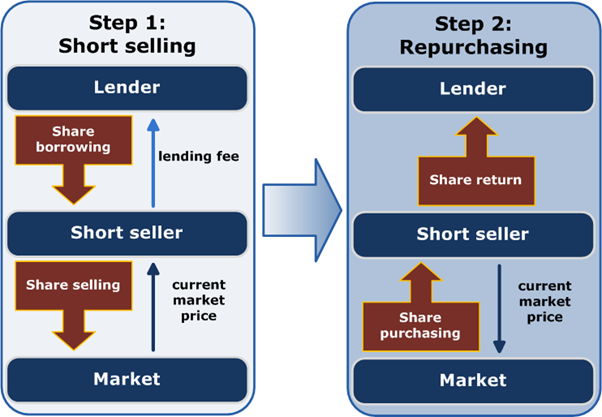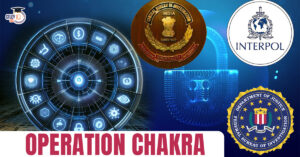Table of Contents
Short Selling
Context: Hindenburg Research accuses SEBI’s investigation into the Adani Group of being compromised, alleging a conflict of interest involving the SEBI Chairman and her husband
About Short Selling
- Short selling occurs when an investor borrows a security and sells it on the open market, planning to repurchase later for less money.
- Short selling is a highly complicated trading strategy that reaps huge profits on correct predictions. At the same time, it could lead to heavy losses if the value of a shorted stock does not go down.
Naked Short Selling
Naked short-selling is when a trader sells shares in some asset without first borrowing them or ensuring they could be borrowed.

| Related Terms |
|
Judicial Clarity
Context: Two recent Supreme Court observations in the bail petitions of Delhi Chief Minister Arvind Kejriwal and former Deputy Chief Minister Manish Sisodia highlighted the need for judicial clarity.
- These cases brought to the forefront the complex issue of the legal status of political parties and individual ministers in the context of criminal investigations.
Legal Analysis
- Section 70 of PMLA: Deals with offences by companies, stating that any person in charge of the company committing an offence shall be deemed guilty.
- Definition of Companies: Includes any body corporate, firm, or association of individuals.
- However, political parties are defined under Section 29A of the Representation of The People Act (RPA), 1951, as “any association or body of individual citizens of India calling itself a political party.”
- Distinction: The PMLA’s definition of “association of individuals” does not explicitly cover political parties, thus legally challenging the inclusion of political parties under this section.
- Ejusdem Generis Rule: Interprets “association of individuals” to mean entities similar to bodies corporate or firms, excluding political parties which do not fit this nature.
- Role of Political Parties: Primarily involved in mobilising people, fighting elections, and running governments, not engaging in transactional activities like businesses.
Policy vs. Criminality
- Cabinet Form of Government: India follows a parliamentary system with a cabinet form of government where the cabinet has the final authority on policy decisions.
- Judicial Review of Policy: The judiciary generally refrains from examining the merits or motives of government policies.
- Ministerial Liability: Individual ministers can be held accountable for personal actions violating the law, but not for collective cabinet decisions.
- Impact on Governance: Criminalising individual ministers for cabinet decisions could hinder effective governance.
Broader Implications
- Political Vendetta: Making political parties susceptible to criminal charges under PMLA and the Prevention of Corruption Act could be used for political vendetta.
- Judiciary’s Clarification Needed: There is a pressing need for the Supreme Court to clarify the applicability of these laws to political parties and the culpability of individual ministers for cabinet decisions to prevent misuse and uphold the integrity of democratic processes.
Skipping Local Trial Of Certain Drugs
Context: The Drug Controller General of India (DCGI) formalised the pathway for certain categories of new drugs to get marketing and manufacturing approval in the country without conducting local clinical trials.
More in News
- The DGCI has waived the requirement for clinical trials of certain categories of drugs in India if they are approved in the US, the UK, Japan, Australia, Canada and the European Union.
- The waiver only covers five categories — orphan drugs for rare diseases, gene and cellular therapy products, new drugs used in pandemic situations, new drugs used for special defence purposes and new drugs having significant therapeutic advances over the current standard care.
- Therapies with significant need include GLP-1 receptor agonists for weight loss, cancer therapies like Tarlatamab (lung cancers) and Tovorafenib (pediatric brain tumour), and treatments for Alzheimer’s disease.
- Drugs needing local clinical trials for new drug applications in specific markets will not be exempt unless major adverse events are ruled out and global trials show positive results.
- The waiver is not automatic.
- The DCGI’s Subject Expert Committee will still have the discretionary power to ask for local clinical trials, especially if there is insufficient evidence supporting the drug’s safety and efficacy in the Indian population.
| Rule 101 of the New Drugs and Clinical Trials, 2019 |
| It allows the DCGI to waive local trials for drugs approved in specified countries with the approval of the Central Government. |
What are the Implications?
- Cost Reduction: The costs of launching new drugs in India will be reduced, benefiting both patients and public health schemes like the Central Government Health Scheme (CGHS) and Ayushman Bharat.
- Rapid Access: This would ensure expeditious availability of the latest medicines for treating diseases like cancers, rare diseases like Spinal Muscular Atrophy (SMA) and Duchenne Muscular Dystrophy (DMA), and autoimmune conditions in India.
- Barriers to Entry Reduced: High costs and lengthy processes of local trials are major obstacles; waiving these can expedite the availability of important drugs in the Indian market.
- Example: Presently, the delay in launching a new or novel medicine in India is anywhere between 5-20 years when compared to western markets.
- Selective Approval: Companies might still need to conduct local trials for specific drugs, especially for alcohol-related or similar cases.
Cyber Security Threat from AI, Disinformation
Context: The year 2024 was anticipated with concerns about new security threats, particularly from advancements in Artificial Intelligence (AI), including Generative AI and Artificial General Intelligence (AGI).
A Year of Digital Challenges
- The 2024 Olympics: The 33rd Summer Olympics in Paris, held in July-August 2024, was considered a high-profile target for digital attacks.
- As of the end of the Paris Olympic Games, no significant security incidents had been reported, marking a relief for security agencies.
- Despite the absence of major incidents, the emergence of new variations of digital threats has necessitated ongoing vigilance by security agencies.
- Disinformation Campaign: The Taiwanese elections in January 2024 were marred by a wave of disinformation, primarily attributed to China.
- AI-generated deepfakes played a significant role in disseminating false information, highlighting the technology’s potential for manipulation.
- Cyberattacks and Disinformation in Ukraine: The ongoing conflict in Ukraine has served as a microcosm of the combined threats of cyberattacks and AI-enabled disinformation.
- Both sides have employed these tactics to disrupt critical infrastructure and sway public opinion.
- The CrowdStrike Outage: A software glitch in Microsoft Windows caused a widespread outage in May 2024, affecting various sectors globally.
- While not a cyberattack, it demonstrated the potential for large-scale disruptions due to software vulnerabilities.
Historical Precedents
To understand the current threat landscape, it’s essential to examine past cyberattacks:
- WannaCry Ransomware (2017): Infected over 230,000 computers in 150 countries, causing billions in damages.
- Shamoon Computer Virus (2017): Targeted oil companies, considered the “biggest hack in history.”
- Petya Malware (2017): Impacted banks, electricity grids, and other critical infrastructure across multiple countries.
- Stuxnet (2010): Targeted Iran’s nuclear program, showcasing the potential for state-sponsored cyberattacks with devastating consequences.
The Growing Cyber Threat
Beyond high-profile attacks, individuals and businesses face a constant barrage of cyber threats:
- Cyber Fraud: Tactics like phishing, identity theft, and false credit card transactions are increasingly common.
- Business Email Compromise (BEC):
- CEO Fraud: Attackers impersonate a company’s CEO or other executives and send emails to employees, instructing them to transfer funds to the attacker’s account.
- Invoice Scams: Cybercriminals compromise a vendor’s email account and send fake invoices to the vendor’s clients, requesting payment to the attacker’s bank account.
- Digital Bullying: The misuse of generative AI content is on the rise.
Mitigating the Threat
Addressing the growing digital threat requires a multi-faceted approach:
- Increased Awareness: Individuals, businesses, and governments must be aware of the evolving threat landscape.
- Robust Security Measures: Organisations should invest in advanced security technologies and practices.
- Government Collaboration: Coordinated efforts between governments and the private sector are crucial.
- International Cooperation: Global cooperation is essential to combat transnational cybercrime.
Conclusion
The convergence of AI, disinformation, and cyberattacks presents a complex and evolving challenge. It is imperative to recognize the severity of these threats and take proactive measures to protect individuals, businesses, and nations.


 Places in News for UPSC 2025 for Prelims...
Places in News for UPSC 2025 for Prelims...
 New Phase of Operation Chakra to Combat ...
New Phase of Operation Chakra to Combat ...
 Soyuz Aircraft: History, Design and Sign...
Soyuz Aircraft: History, Design and Sign...





















